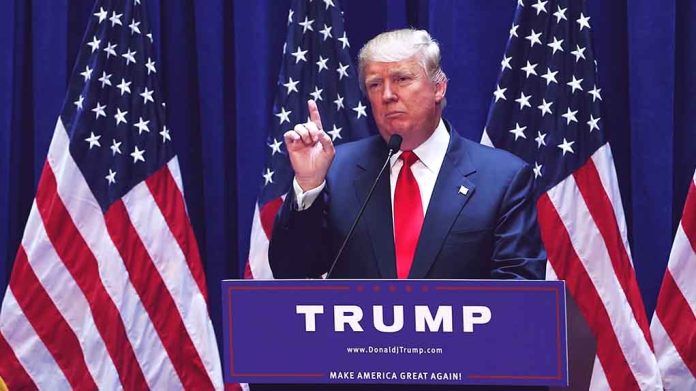
President-elect Donald Trump’s nomination of Billy Long as IRS Commissioner sparks debate on the future of tax policy and IRS operations, including the controversial Direct File program.
At a Glance
- Trump nominates Billy Long, a former Missouri Congressman, as IRS Commissioner
- Long’s unconventional background raises questions about his qualifications
- Republicans push to terminate the IRS Direct File program
- Debate centers on the IRS’s role in tax preparation and enforcement
- Potential shifts in tax policy and IRS operations loom with Long’s nomination
Trump’s Unexpected IRS Commissioner Nominee
President-elect Donald Trump has nominated former Missouri Congressman Billy Long as the next IRS Commissioner, igniting a heated debate about the future of tax policy and IRS operations. Long, an unconventional choice with a background as a certified auctioneer and no college degree, would oversee an agency with 85,000 employees and a $12 billion annual budget if confirmed.
Long’s nomination has received mixed reactions, with some praising his outsider perspective while others question his qualifications. The current IRS Commissioner, Danny Werfel, appointed by President Biden, has a term ending in 2027. This overlap has led to speculation about potential changes in leadership and direction at the IRS.
For the 2025 filing season, #IRS Direct File will be available to more than 30 million taxpayers in 24 states and include new features to make filing taxes quicker and easier. Read more here about the expansion of the free e-filing service: https://t.co/Xebx1jK1XY
— IRSnews (@IRSnews) November 12, 2024
The Controversial Direct File Program
At the center of the debate is the IRS Direct File program, a free tax filing service that allows taxpayers to submit simple returns directly to the IRS, bypassing third-party providers. In 2024, 140,000 Americans utilized this service, which was initially piloted in 12 states and expanded to 12 additional states for the 2025 tax filing season.
“We’re excited about the improvements to Direct File and the millions more taxpayers who will be eligible to use the service this year,” said IRS Commissioner Danny Werfel.
However, Republican lawmakers are urging President-elect Trump to terminate the program, labeling it “unauthorized and wasteful” and a conflict of interest. They argue that the IRS should not serve as both tax preparer and enforcer, raising concerns about the agency’s expanding role in tax administration.
Our Administration is expanding the Direct File program that enables taxpayers to file taxes for free directly with the IRS.
We’re calling on all 50 states and D.C. to join us in saving money for taxpayers across the country by participating in Direct File next year. pic.twitter.com/I2fTcj03bD
— The White House (@WhiteHouse) May 31, 2024
Potential Shifts in Tax Policy
Long’s nomination could signal significant changes in tax policy and IRS operations. Republicans plan to reshape tax policy before key aspects of the Tax Cuts and Jobs Act (TCJA) expire. Priorities include making individual tax cuts permanent and maintaining a lower corporate tax rate.
“Taxpayers and the exceptional staff at the IRS will appreciate having Billy in charge,” Trump stated, expressing confidence in his nominee.
However, critics worry that Long’s appointment could shift the IRS’s focus away from enforcing tax compliance among high-income individuals and corporations. The agency is already facing a $20 billion reduction in special funding and a proposed $2.2 billion budget cut, which could impact its modernization efforts and tax compliance initiatives.
The Road Ahead
As the confirmation process for Long’s nomination unfolds, the debate over the IRS’s role and the future of tax administration in the U.S. is likely to intensify. The outcome could have far-reaching implications for taxpayers, the tax preparation industry, and the overall efficiency of the nation’s tax system.
With the potential termination of the Direct File program and shifts in tax policy on the horizon, Americans may need to prepare for changes in how they interact with the IRS and fulfill their tax obligations in the coming years. As the Trump administration takes shape, the future of tax policy and IRS operations remains a topic of keen interest and ongoing debate.
Sources:
- IRS Tax Filing Change Proposed Under Donald Trump
- IRS Shakeup? What Trump’s Commissioner Pick Could Mean for Taxes






